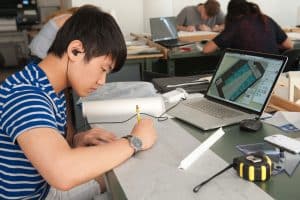The Rassias Center Accelerated Language Programs at Dartmouth
Are you aspiring to get into the college of your dreams and searching for a unique edge in your application? The Rassias Center Accelerated Language Programs at Dartmouth College could be just what you need. In this blog, we’ll dive into how these innovative language programs can enhance your college application and expand your global perspective.
Whether you’re a language enthusiast or someone looking to add an impressive skill to your portfolio, this program offers an unparalleled opportunity. Let’s explore how Dartmouth’s Rassias Center can help you stand out in the competitive world of college admissions.
What are the Accelerated Language Programs?
The Rassias Center Accelerated Language Programs (ALPs) at Dartmouth College offer an intensive language learning experience using the Rassias Method®. Since its inception in 1980, the Accelerated Language Programs have been attracting students and language teachers of various ages and interests to the Dartmouth campus, providing an immersive ten-day language and cultural learning experience.
This program is unique for its approach that encourages learning a new language from day one, making it particularly appealing to those with a passion for languages but limited time.
The Rassias Method®, central to the ALPs, was originally developed in the early 1960s for training Peace Corps volunteers and later adapted for college-level instruction in 1967. This method combines dramatic techniques, rhythmic drills, and energetic reinforcement strategies.
The aim is to create an engaging and inhibition-free learning environment. This method is recognized for its effectiveness in increasing oral proficiency and practical application of the language, and it’s utilized widely in colleges and schools both nationally and internationally.
The Accelerated Language Programs at Dartmouth College are designed to make participants feel comfortable and natural with the language in an error-tolerant atmosphere. The daily sessions are structured to enhance oral proficiency and practical language use.
Participants find themselves among motivated individuals where language is intertwined with culture. The Rassias Center’s mission is rooted in a humanistic approach to language instruction, emphasizing cultural sensitivity, appreciation of differences, and effective communication.
Additionally, the Rassias Center for World Languages and Cultures at Dartmouth College, which runs the ALPs, is a non-profit organization committed to promoting cultural understanding and strengthening global communication. Founded in 1981 and becoming part of Dartmouth as a department under the Provost’s Office in 2007, the Center also offers other programs like teacher workshops and community language programs.
For students aspiring to join top colleges, participating in the ALPs could be a transformative experience, adding a unique dimension to their college applications and broadening their cultural and linguistic horizons.

The Significance of ALPs for Prospective College Students
These programs are not just about language learning; they are a gateway to enhancing your academic profile, broadening your cultural perspective, and improving your chances of success in the competitive arena of college admissions.
Firstly, consider the academic benefits. The ALPs’ immersive approach to language learning, leveraging the Rassias Method®, is designed to rapidly increase your language proficiency. This method, which combines dramatic techniques, rhythmic drills, and energetic reinforcement strategies, is recognized for its effectiveness in making you comfortable and natural with a new language in a relatively short amount of time.
As you know, colleges often look for students who show a commitment to academic excellence and a willingness to challenge themselves. By successfully completing a program that is intensive and respected, like the ALPs, you demonstrate these qualities.
Furthermore, the ALPs offer a unique form of cultural immersion. In today’s globalized world, colleges and employers alike value cultural awareness and sensitivity. Participating in a program where language is intrinsically linked with culture positions you as a student who is not only linguistically competent but also culturally aware.
This awareness can be particularly advantageous in college applications, as it aligns with the increasing emphasis on global citizenship in higher education.
The ALPs also offer an excellent opportunity for personal growth. The immersive, intensive nature of the program encourages you to step out of your comfort zone, fostering qualities such as adaptability, resilience, and independence. These are traits that colleges often seek in their students, as they are indicative of individuals who are likely to succeed in a challenging academic environment and contribute positively to the campus community.
Participating in the ALPs can also expand your network. You will be in the company of like-minded peers and educators who share your interest in languages and cultures. This networking can open doors to future opportunities, be it recommendations, internships, or other educational pursuits. Building a diverse network early on can provide a solid foundation for your academic and professional future.
Moreover, the skills you gain in the ALPs are transferable. The ability to quickly learn and apply a new language demonstrates to colleges your potential for success in other academic areas. It shows your capability to process new information effectively, a skill highly valued in any educational setting. This aspect of the ALPs can make your college application stand out, as it directly showcases your learning agility and intellectual curiosity.
Lastly, the experience of the ALPs can serve as a compelling topic for your college essays. The challenges and triumphs of learning a new language in an immersive setting can provide rich material for personal statements and essays. It allows you to present a narrative of personal growth, cultural exploration, and academic achievement, all of which are appealing to college admissions committees.

How Do I Apply to a Rassias Center Accelerated Language Program?
Although the Rassias Center hasn’t announced any upcoming sessions since the pandemic, other programs have been continuing, and some are coming back, such as the special program titled Spanish for Healthcare Professionals.
1. Checking Program Dates and Languages Offered: The ALPs offer courses in various languages, typically including options like Brazilian Portuguese, Business English (ESL), French, German, Italian, Russian, Spanish, and Medical Spanish.
However, the offerings may change, so it’s important to check the current year’s program for available languages and their respective dates. Knowing the specific timelines and languages will assist in planning your schedule and ensuring that you can commit to the full duration of the course.
2. Meeting the Age Requirement: The ALPs are designed for adult learners, with a minimum age requirement of 18 years. This is important for prospective students to note, as it ensures that participants are mature enough for the intensive learning environment and can fully engage with the program’s rigorous curriculum.
3. Reviewing the Fees: Understanding the cost is a critical step. The program requires a non-refundable enrollment fee and a separate program fee that covers instruction and materials. Additional costs include optional dormitory housing and a parking pass if needed. It’s essential to be aware of the payment deadlines and the total financial commitment required.
- $500 Enrollment Fee (required) Non-refundable
- $1,990 Program Fee (required) Includes instruction and classroom materials.
- $300 Supplementary Program Fee for Medical Spanish – additional course hours and content
- $695 Dormitory Housing Package Fee (optional): 7 nights in a dormitory room (single occupancy unless otherwise requested) and meals in the dining hall.
- $70 Dormitory Housing, per additional night (dormitory room only)
- $120 Parking Pass (optional) – Allows you to park in the designated parking lot.
Understand that these prices may change in the future, so it’s best to stay tuned for updates once the ALPs resume.
4. Exploring Scholarship Opportunities: The Rassias Center offers scholarships to help cover the costs of the ALPs. These scholarships often require an essay submission. Prospective students should explore these opportunities early to meet application deadlines. Understanding the scholarship requirements, such as essay topics and length, and the application process, is crucial for securing financial assistance.
5. Understanding the Cancellation Policy: Knowing the program’s cancellation policy is important in case you need to withdraw from the program. Familiarizing yourself with the deadlines for cancellation and the financial implications of withdrawing after certain dates helps manage risks and make informed decisions.
6. Contacting the Rassias Center for Enrollment: Once you have gathered all the necessary information and are ready to proceed, the final step is to enroll by contacting the Rassias Center. You can do this via phone or email. This step is about initiating the process and providing necessary personal and educational information.
Each of these steps requires careful consideration and planning. Prospective students should approach the enrollment process methodically to ensure that they are well-prepared for this unique and intensive language learning experience.
Why Should I Enroll in an Accelerated Language Program?
Enrolling in an Accelerated Language Program can offer several significant benefits for you as a student.
1. Rapid Language Acquisition: ALPs are specifically designed for swift language learning. Unlike traditional language courses that may take months or years, an accelerated program immerses you in the language, allowing for faster comprehension and speech development.
This rapid acquisition is especially beneficial if you need to learn a language quickly for academic, professional, or personal reasons. Engaging in an intensive learning environment means you will be speaking and understanding the new language more quickly than through traditional methods.
2. Cultural Immersion and Global Awareness: ALPs often integrate cultural elements into the language learning process. This immersion provides you with a deeper understanding of the language in its cultural context, enhancing your global awareness.
This aspect is particularly important in our interconnected world, where cultural sensitivity and international perspectives are highly valued. By understanding the nuances of a language within its cultural setting, you develop a more profound appreciation and respect for diversity.
3. Enhanced Cognitive Skills: Learning a new language is a rigorous mental exercise that improves various cognitive skills. These include better problem-solving abilities, enhanced memory, and increased mental flexibility. The intensive nature of an ALP challenges your brain, leading to improved overall mental function. These cognitive benefits extend beyond language learning, positively impacting your academic performance in other subjects and enhancing your ability to adapt to new situations.
4. Career and Academic Advantages: Proficiency in a second language is a highly desirable skill in many careers and academic fields. Enrolling in an ALP can give you a competitive edge in the job market and in college admissions. It demonstrates your commitment to self-improvement and your ability to take on and succeed in challenging endeavors.
Furthermore, the skills and experiences gained from an accelerated language program can be compelling points in resumes and college applications, showcasing your initiative and dedication to personal growth.
Cultural Diversity and Inclusion in the Dartmouth Community
As an ALP participant, your experience can be significantly enriched by the diverse environment Dartmouth offers. This diversity is not just in terms of nationality or ethnicity, but also in the variety of perspectives, experiences, and ideas that each member brings to the community.
Dartmouth’s commitment to diversity means that you will be interacting with students and faculty from various backgrounds. This interaction goes beyond just learning a new language; it’s about understanding different cultures and viewpoints.
It’s a chance for you to engage in discussions, participate in activities, and create friendships with people whose life experiences may be vastly different from your own. This environment not only enhances your language skills but also broadens your understanding of the world.
Inclusion is another key aspect of your experience at Dartmouth. Inclusion means that every member of the Dartmouth community, including you, is valued and respected. It’s about creating an environment where everyone feels welcome and empowered to participate fully.
As an ALP student, you’ll find that your ideas and contributions are encouraged and appreciated, regardless of your background. This inclusive culture fosters a sense of belonging and helps you to engage more deeply with your studies and the community.
You will also find that Dartmouth actively works to promote cultural exchange and understanding. There may be events, workshops, and seminars designed to celebrate and learn about different cultures. Participating in these events can enrich your understanding of the world and provide a more comprehensive educational experience.
Moreover, the diverse and inclusive environment at Dartmouth encourages you to develop key skills that are highly valued in today’s globalized world, such as cross-cultural communication, empathy, and adaptability. These skills are not only beneficial in your personal growth but are also critical in a wide range of professional fields.
It’s important to recognize that diversity and inclusion are not just concepts to be learned but are experiences to be lived. As you interact with people from different cultures and backgrounds, you will encounter new ways of thinking and new perspectives. This exposure is invaluable as it challenges you to think critically and develop a more nuanced understanding of the world.
Furthermore, Dartmouth’s commitment to diversity and inclusion extends to providing support services to ensure that all students, including those in the ALPs, have the resources they need to succeed. Whether it’s academic support, language assistance, or cultural adjustment, there are numerous resources available to help you navigate your time at Dartmouth.

What are the Societal and Industry Relevance of these Programs?
When considering the relevance of the Accelerated Language Programs, it’s essential to focus on how these programs can significantly benefit you, as a student, in today’s globalized world. Language skills are not just academic achievements; they are tools that can reshape your personal and professional trajectory.
Firstly, let’s discuss societal relevance. In our increasingly interconnected world, the ability to communicate across cultures is more valuable than ever. By engaging in an ALP, you’re not just learning a language; you’re immersing yourself in a new culture. This experience cultivates empathy, cultural sensitivity, and a broader worldview.
These are qualities highly sought after in nearly every professional field, from healthcare and education to business and politics. In essence, these programs equip you with the ability to understand and connect with people from different backgrounds, which is invaluable in our diverse global society.
Moreover, language proficiency fosters personal growth. It enhances cognitive abilities like memory and problem-solving skills. Learning a new language has also been linked to improved decision-making and even delaying the onset of dementia. As a student, these cognitive benefits can positively impact your academic performance across all subjects, not just language studies.
Now, let’s consider the industry relevance. In a global economy, businesses are constantly looking for individuals who can bridge language barriers. Proficiency in a second language can make you a more competitive candidate in the job market. It opens up opportunities for international assignments, dealings with foreign clients, and positions in multinational corporations. In industries like tourism, translation, international law, and diplomacy, language skills are not just an asset; they’re a requirement.
Furthermore, the ALPs at Dartmouth are known for their intensive and immersive approach, which is highly effective for rapid language acquisition. This aspect is particularly relevant in industries where time is of the essence. For example, in international relations or global health, the ability to quickly learn and utilize a new language can be crucial.
In sectors like technology and media, the demand for multilingual professionals is growing rapidly. Companies are constantly expanding their reach to new markets, which requires content localization and culturally sensitive communication strategies. Your language skills enable you to play a pivotal role in these areas, facilitating effective communication and helping businesses cater to a global audience.
Additionally, the collaborative and immersive nature of the Rassias Method used in these programs also hones your teamwork and interpersonal skills. These are vital competencies in almost every career, as they enhance your ability to work effectively in diverse teams and environments.
In the academic realm, if you’re considering a career in research or academia, language skills can open doors to international collaborations and access to a broader range of scholarly works. It allows you to engage with primary sources in their original language, which is a significant advantage in fields like history, literature, and anthropology.
Lastly, considering the societal impact, language skills can empower you to contribute to social justice and community development initiatives. Whether it’s through translation work for non-profits, assisting in immigrant communities, or advocating for underrepresented groups, your ability to communicate across languages can have a profound positive impact on society.

How Do I Build a Strong Network at the ALPs?
Building a strong network is crucial for maximizing the benefits of the experience. Here are some key points on how you can effectively build a strong network:
1. Active Participation in Classes and Activities: Engage actively in all classes and group activities. By showing enthusiasm and a willingness to learn, you become more approachable and memorable to both peers and instructors.
This active participation also allows you to showcase your skills and interests, making it easier for others with similar interests to connect with you. Remember, every class, workshop, and activity is an opportunity to meet someone new and form a connection that could be valuable in the future.
2. Initiate Conversations and Group Studies: Don’t hesitate to initiate conversations with your peers and instructors. Ask about their experiences, share your own, and find common ground. Proposing group study sessions or language practice meetups can be a great way to deepen these connections. These interactions are not just about improving your language skills; they’re also about getting to know people on a personal level, which is the foundation of a strong network.
3. Attend Social Events and Networking Opportunities: ALPs often organize social events, cultural nights, or networking opportunities. Make sure to attend these events as they are excellent platforms for meeting new people and expanding your network. During these events, aim to interact with a diverse group of participants. This diversity can provide a broader range of perspectives and potentially open up more opportunities in different fields and locations.
4. Follow Up and Stay in Touch: Building a network is not just about making initial contacts; it’s also about maintaining those relationships. Collect contact information and follow up with the people you meet. A quick message or email after the program can keep the connection alive. Social media platforms can also be effective tools for staying in touch. Regularly reaching out, sharing relevant information or just checking in can turn a short-term acquaintance into a long-term professional contact.
5. Collaborate on Projects or Language Practice: Collaboration is a powerful way to strengthen relationships. If there’s an opportunity to work on a project together, take it. Collaborating on assignments or even organizing language practice sessions can solidify your relationships. These collaborations are not only beneficial for your language skills but also demonstrate your ability to work in a team, a skill highly valued in professional settings.
Remember, the network you build during your time in the ALPs can be invaluable for your academic and professional future. It’s about creating lasting connections that can provide support, advice, and opportunities down the line. Approach each interaction with openness and a genuine interest in others, and you’ll find building a network to be a rewarding part of your ALP experience.
Leveraging Dartmouth’s Resources for Success
Leveraging Dartmouth College’s resources can greatly enhance your experience and success in the Accelerated Language Program. Here are some key strategies:
1. Utilize the Rassias Center’s Expert Faculty: The Rassias Center at Dartmouth is renowned for its dedicated and experienced faculty. You can benefit immensely by actively engaging with these experts. Seek their guidance not only in language learning but also in understanding cultural nuances and advanced language application.
Their insights can provide a deeper understanding of the language and its real-world use. Additionally, faculty members can offer valuable advice on academic and career opportunities related to language studies.
2. Take Advantage of Library and Research Facilities: Dartmouth’s libraries are a treasure trove of resources. They offer access to a vast array of books, academic journals, and multimedia resources in various languages. Utilizing these resources can supplement your learning in the ALPs. For instance, reading books or watching films in the target language can enhance your comprehension and cultural understanding. The library staff can also assist in finding materials relevant to your language and cultural studies.
3. Participate in Language and Cultural Clubs: Dartmouth hosts various language and cultural clubs that can be beneficial. Joining these clubs allows you to practice the language in a relaxed, social setting and learn more about the culture associated with it.
These clubs often organize events, language practice sessions, and cultural activities, providing a practical aspect to your language learning. Engaging with peers who share similar interests can also help build a supportive community around your language studies.
4. Engage with Technology and Language Labs: Dartmouth’s language labs and technological resources are excellent tools for language learning. These labs often provide software and programs specifically designed for language practice, including pronunciation, listening, and grammar exercises.
Make the most of these technologies to reinforce what you learn in the classroom. Additionally, online resources available through the college can offer interactive ways to practice and improve your language skills.
5. Network with Alumni and Professionals: Dartmouth’s extensive alumni network can be a valuable resource. Connecting with alumni who have participated in the ALPs or who work in language-related fields can provide insights into how to apply your language skills in professional settings. They can also offer advice on career paths and opportunities post-graduation. Don’t hesitate to reach out to them for informational interviews or mentorship.

Developing Essential Skills Through Summer Programs
Such programs are not just about academic enrichment; they are avenues for developing a range of essential skills that can benefit you both personally and professionally. Let’s explore how these summer programs can enhance your skill set.
Firstly, these programs offer an intensive focus on language learning, which is an invaluable skill in today’s globalized world. Proficiency in a foreign language is not just a resume booster; it opens doors to understanding different cultures and perspectives, which is increasingly important in diverse professional and social settings.
Whether you’re considering a career in international relations, business, healthcare, or academia, language skills can give you a significant edge.
Beyond language skills, immersion in a program like ALPs also sharpens your cognitive abilities. Learning a new language involves memory, problem-solving, and critical thinking, all of which are transferable skills relevant to any academic discipline or career path.
Moreover, the process of language acquisition can improve your multitasking abilities and even enhance creativity, as it requires you to think and respond quickly in new contexts.
One of the key benefits of such programs is the development of cultural competence. Being culturally competent means you understand and can interact effectively with people from cultures different from your own.
This skill is increasingly sought after in many professional fields, as it ensures that you can work effectively in diverse teams and environments. Understanding cultural nuances and being able to communicate effectively across cultural boundaries are vital skills in today’s interconnected world.
Additionally, these programs often involve collaborative learning environments, where you work with peers from various backgrounds. This setting enhances your teamwork and collaboration skills. You learn to listen, share ideas, and respect different viewpoints, which are crucial skills in both academic and professional settings. Effective teamwork also involves conflict resolution and negotiation skills, both of which you can develop in a diverse learning environment.
Another important aspect is the development of interpersonal skills. Engaging with instructors and peers in a new language requires and reinforces skills like active listening, empathy, and effective communication. These are essential skills for any field, as they enhance your ability to connect with others, build relationships, and work effectively in team settings.
Participating in an ALP also requires a high degree of self-discipline and motivation. The intensive nature of these programs means you will need to manage your time effectively, stay focused on your goals, and work diligently. These self-management skills are vital for success in any area of life, from academic pursuits to personal projects.
Furthermore, these programs often offer opportunities for leadership development. You might find yourself in situations where you lead group activities or discussions, or perhaps assist peers who are struggling with certain aspects of the program. Such experiences can enhance your leadership skills, including decision-making, problem-solving, and the ability to motivate and inspire others.
Lastly, attending a summer program like ALPs can boost your confidence. Successfully learning a new language and adapting to a new educational environment are significant achievements. This experience can make you more confident in your abilities to face new challenges, adapt to change, and overcome obstacles.
Effective Time Management Strategies for Participants
Effective time management is essential for participants. Here are some strategies to help you manage your time effectively:
1. Set Clear Goals and Priorities: Begin by setting specific, achievable goals for what you want to accomplish in the ALPs. Break down these goals into smaller, manageable tasks. Prioritize these tasks based on their importance and deadlines. For instance, focus first on assignments due soonest or on aspects of the language you find most challenging. Remember, clear goals keep you focused and help prevent feeling overwhelmed by the workload.
2. Create a Structured Schedule: Design a daily and weekly schedule that allocates specific times for classes, study sessions, language practice, and leisure activities. Stick to this schedule as closely as possible. Consistency is key in language learning, so ensure that you dedicate time every day to practice and review. Include breaks and leisure time in your schedule to avoid burnout and maintain a healthy balance.
3. Utilize Efficient Study Techniques: Adopt study methods that maximize learning within a limited time. Techniques like spaced repetition, active recall, and immersive language practice can be highly effective.
For example, instead of passively reading or listening, engage with the material by summarizing it in your own words or teaching the concept to someone else. This active engagement helps you retain information better and makes your study sessions more productive.
4. Minimize Distractions: Identify and minimize distractions that can disrupt your focus. This might involve finding a quiet study space, turning off unnecessary digital notifications, or setting specific times for checking emails and social media. Remember, the quality of your study time is just as important as the quantity. Focused study sessions are more effective than longer periods with frequent interruptions.
5. Regularly Review and Adjust Your Plan: Periodically review your goals and progress. Are you meeting your language learning objectives? Are there areas where you need to invest more time? Adjust your schedule and strategies as needed based on your progress and feedback from instructors. Flexibility is important, as your needs and challenges may change over the course of the program.
Remember, effective time management is a skill that requires practice and adaptation. By setting clear goals, creating a structured schedule, utilizing efficient study techniques, minimizing distractions, and regularly reviewing your plan, you can make the most of your time in the ALPs and achieve your language learning objectives.

Final Thoughts
As you navigate the journey to your dream college, remember that unique experiences like the Rassias Center Accelerated Language Programs at Dartmouth can significantly enhance your application.
You’ve seen how these programs not only offer language proficiency but also cultural immersion, critical thinking skills, and a global network. You are now equipped with knowledge about a program that can give you an edge in the admissions process and prepare you for a successful academic and professional future. Consider how embracing this opportunity can transform your college application and set you on a path to achieving your dreams.
It is important to have all the necessary information before making any decision. AdmissionSight is always here to help you with any questions or concerns. We have over ten years of experience helping students successfully navigate the challenging admissions process.
Consult with AdmissionSight and find out how we can help you get into the school of your choice by ensuring that you are fully informed and prepared for the application process. We will work with you to develop a personalized plan that meets your specific needs and goals. We will also provide you with access to our team of experts who can help you with everything from choosing the right schools to writing your essays.
Don’t let the admissions process overwhelm you. Contact AdmissionSight today and let us help you achieve your dreams.



































